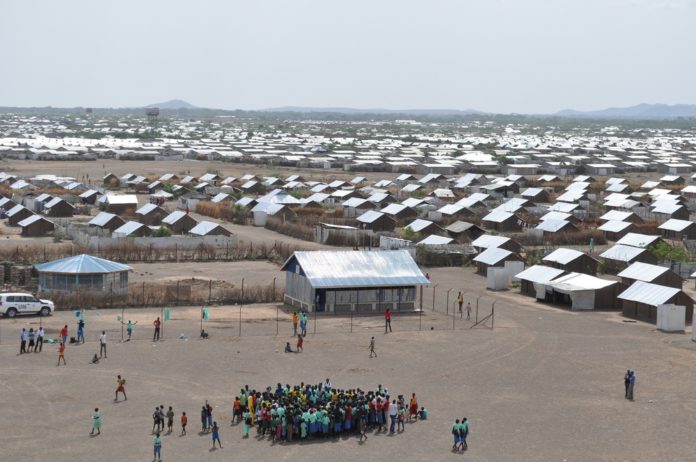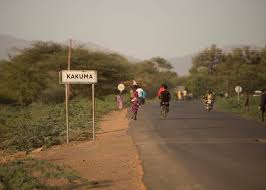|
Getting your Trinity Audio player ready...
|
By Michael Kwena
Kakuma, Turkana: Stephen Tama, is a refugee who has stayed at Kakuma refugee camp for the past eight years, he complains that the rationing of food has pushed a number of them to search for jobs within Kakuma town in such of a livelihood.
Tama who runs a barbershop in Kakuma town narrated how difficult life has become inside the refugee camp. He was born and raised in DR. Congo.
“We used to get enough food but nowadays things have changed. The food that we’re given is not enough to take you for even a period of two weeks despite the food being meant for a month”, he said
He said the situation was an eye-opener to many youthful refugees who have since moved out of the camp to look for Juakali jobs around the town.
He admitted that the UN organization gives them Sh 500 per month per head though the money is not in cash form. The funds are referred to Bamba Chakula.
A few meters from Tama’s barbershop is Augustine Baraka. He runs a butcher shop. He is also a native of DR Congo.
Baraka has worked here for the last year since he landed in Kakuma. However, lack of having essential documents to reveal his identity was a major challenge in finding the job, but he was lucky to secure one
“I have a family to feed and with less food that we’re receiving from the humanitarian organization, I had to look for a job that I can be able to provide for my young family”, he lamented
He says life has not been easy since the outbreak of the deadly COVID-19, with locals blaming the refugees for taking up their jobs
“We’re being harassed and called names but we have to persevere. We know why we’re doing this kind of business and I don’t regret being a butcher here”, he said.
The refugees are now asking the UNHCR to consider adding more food to families in order to fill the gaps that argue, can lead to starvation within the camp.
Perennial wars that have been witnessed in many nations around the world have led millions of people to flee their homeland and move to other places as refugees to save their lives.
The situation is stressful for refugees, as many of them flee their homes without even saying goodbye to their families. Here in Kenya, there are two refugee camps. One is Daadab in Garissa county and Kakuma camp in Turkana county.
The refugees live inside the camps but the living conditions within the camp have pushed some of them to rent houses in neighboring villages.
Turkana county is one of the regions that has been hit hard by drought and with refugees living in Kakuma, most humanitarian organizations have been attracted and have established their offices here.
The organizations offer solutions to different needs ranging from food, water, housing, businesses, and power solutions.
Kakuma refugee camp currently has a population of more than 150,000 refugees and the number is expected to double very soon following the government’s plan to shut down the Daadab refugee camp and relocate the refugees to the Kakuma camp.
The health global pandemic, coronavirus, has had a negative impact on most organizations working in Kakuma. Some have reduced their support due to funding crises thus pushing some of the refugees to look for avenues to sustain their needs.
Typically, refugees are under the United Nations High Commissioner for Refugees (UNHCR). The UN organization is responsible for catering for their needs though, the current situation has pushed a number of them to look for perennial jobs to be able to sustain themselves.
According to refugees in Kakuma camp, there comes at a time when the World Food Program (WFP) has appealed for Sh6.3 billion to support more than 435,000 refugees in Kenya between January and June 2021.
The humanitarian agency said the refugees face imminent food shortages unless new funding is secured.
The impacts of COVID-19 among the refugees in Kakuma is evident as many refugees have opted to start their small-medium enterprises in a bid to make ends meet.
Speaking to talk Africa, Nzeyimana Lailati a refugee from Burundi, linked the current food shortfall in the camp with the corona pandemic showing hope that the situation will change come 2021 after authorities authorized corona vaccines for use,
Life changed for the worse for Lailati following the corona outbreak and she has been up and down in her small business in town. She is a vegetable vendor in town.
“I have been at home for a long time and I realized staying there won’t change my life in any way. Despite the UN agency providing food for us, it’s not enough to take us through the month”, she said
She revealed that, since she ventured into the business, she has been able to provide comfortably for her children in the camp and has encouraged other women living in the camp, to move out and look for jobs instead of waiting for the UN’s support at this time of the pandemic
Most organizations in Kakuma have drastically for months received less funding to continue with their efforts to change refugee’s lives and it had a major negative impact on them.
Meanwhile, some organizations operating in Kakuma, have been offering grants to refugees in a bid to cushion them from the effects of the corona pandemic.















